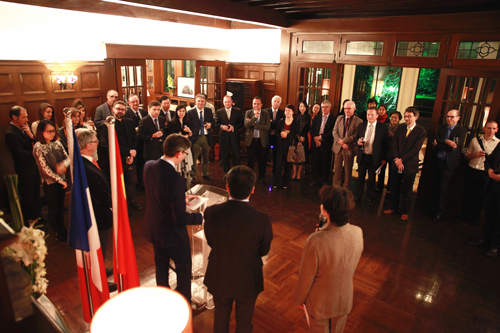
JORISS Steering Committee meetings are organized on an annual basis. The objective of the Steering Committee is to make decisions on the main issues of the program and especially the selection of the projects to be funded. Steering Committee meetings are often held in parallel with the JORISS Lectures.
The JoRISS Lecture Series is intended as a series of annual or bi-annual single lectures delivered for the general public by high profile personalities with a variety of competences and backgrounds.
The JoRISS Lecture Series was inaugurated in December 2015. It is intended as a series of annual or bi-annual single lectures delivered at JoRISS for the general public by high profile personalities with a variety of competences and backgrounds. Each lecture is one hour long and includes a discussion with the audience. They usually take place in Lyon or in Shanghai.
Their primary goal is to nourish the reflection of the JoRISS community in the area of science and society by addressing themes of particular relevance to the general ambition of the JoRISS platform, which is to foster Sino-French scientific collaborations conducted in the spirit of an improved articulation of scientific investigation with societal needs.They deal accordingly with a great diversity of topics, such as the presentation of a cutting edge scientific area with significant impact for modern societies, the exposition of personal views on some specific science and society issue, the sharing of a professional experience or realization...
Lecture 1: The Human Mind: a new frontier for science, a new hope for society, Professor Daniel ANDLER Sorbonne University and École normale supérieure, December 8, 2015
Lecture abstract: Some 70 years ago, the project of making the human mind a proper object for natural science took form. Psychology, in tandem with artificial intelligence, neuroscience, linguistics, anthropology, evolutionary biology and more, gave rise to the so-called cognitive sciences. A new frontier was in fact opened. However the new science of the mind raised some severe objections: it was thought by critics to be (i) reductionist and scientistic, (ii) intellectualist, (iii) individualistic, (iv) theoretical and removed from real-life contexts, therefore with little practical use. As it turns out, the scientific approach to the mind holds a tremendous potential for a novel understanding of the natural underpinnings of social life, and for applications to some of the most pressing real-life problems of both individuals and societies. The lecture will show how science has brought together the individual and social dimensions and the contributions it can begin to make to central areas of human activity such as health and education.
Lecture 2: Saving Our Deltas: Challenges & Opportunities, lecture given by Professor CHEN Zhongyuan East China Normal University in the presence of ECNU Vice-President for Research Wang Rongming and ENS de Lyon delegation led by President Jean-François Pinton, on November 11, 2016
Lecture 3: Ethics and Politics of Global Knowledge, Professor Jean-Marc COICAUD Rutgers University, December 6, 2017
Lecture abstract: a personal analysis of the emerging field of Global Studies and addressed some of the main issues raised by the recent transformation in knowledge: What do the notions of global studies and global knowledge in social sciences really mean? Why do they arguably constitute important new tools for analyzing and understanding the world in which we live today? How does a global approach modify the traditional modes of thinking, for instance in political theory and international law? What kind of ethics and politics of knowledge does it convey? What are its implications for the future research and teaching?
Lecture 4: Science and Society: A view based on the restructuring evolutions of education and research institutions in France, Professor Jean-François PINTON École normale supérieure de Lyon, December 5, 2018
Lecture abstract: In Europe, many higher education institutions have undergone significant reconfigurations during the past ten to fifteen years. Although motivations linked to international rankings have been put forward, it will be argued that the changes stem from much deeper concerns and question the very fabric of our “university systems”. These issues will be discussed in the context of recent initiatives in France, and the case of the Lyon area will be used as a primary example.
Lecture 5: the Fifth Lecture of the JoRISS Lecture Series organized by the Joint Research Institute for Science and Society (Ecole Normale Supérieure de Lyon, East China Normal University, CNRS) on, December 11, 2019 : World-Class University for Global Intercultural Communication: ECNU Mission and Practice, delivered by Pr. QIAN Xuhong, Professor and President of East China Normal University, heading an important ECNU delegation to Lyon.
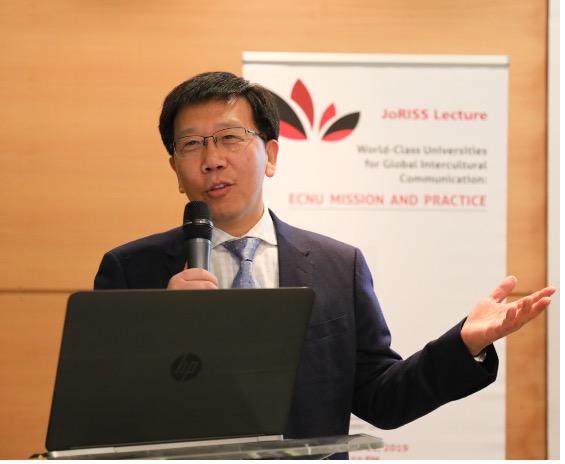
Lecture abstract: Focusing on the specific case of East China Normal University, a comprehensive Shanghai research university that he presides since 1917 and that is part of the “Double First-class” program of China, Professor QIAN Xuhong presented his views about the transformation of higher education institutions into World Class Universities in an environment of increasing intercultural dialogue and international exchange.
The JoRISS steering committee gathers officials from the ECNU and ENS de Lyon for an annual meeting during which research projects are selected, funds are granted and policy matters are discussed.
The Steering Committee of JoRISS met at ECNU Shanghai October 21, 2010 to deliberate on the research projects selected following the call for projects launched in summer 2010.
Three projects have been retained:
- The Center for the Study of Urban Dynamics
(Pr. Yves WINKIN and Pr. DING Jinghong) - The Knowledge and Action Laboratory
(Pr. Jean-Michel ROY and Pr. YU Zhenhua) - Cleaner Oxidation Process Based on FDU and MCM-41 Titanium Catalyst
(Pr. Laurent BONNEVIOT and Pr. HE Mingyuan)
Professor Jean-Michel ROY and Professor ZHU Zhiqiang were respectively appointed French and Chinese Coordinators of JoRISS
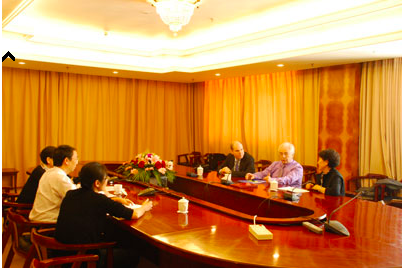
The Steering Committee of JoRISS met at the ECNU Shanghai on October 20, 2011 to deliberate on the research projects selected for 2012 and again on November 3, 2011 to select the proposals received following the call for 2012 project of July 8th.
5 projects were selected:
- 3 new projects :
- Molecular mechanisms underlying differential transcriptional regulation and function by nuclear hormone receptor isoforms
(Pr. WENG Jiemin & Dr. Karine GAUTHIER-VANACKER) - High resolution Imaging in mechanobiology by CRAS microscopy
(Pr. XU Jianhua & Dr. Françoise ARGOUL) - Use of the zebrafish system to test the biological activities présent in traditional chinese médicine
(Pr. CHEN Xiaoyong & Pr. Vincent LAUDET
- Molecular mechanisms underlying differential transcriptional regulation and function by nuclear hormone receptor isoforms
- 2 continuing projects :
- The Knowledge and Action Laboratory Lab (KAL)
(Pr. YU Zhenhua & Pr. Jean-Michel ROY) - Cleaner Oxidation Process Based on FDU and MCM-41 Titanium Catalyst
(Pr. HE Mingyuan & Pr. Laurent BONNEVIOT)
- The Knowledge and Action Laboratory Lab (KAL)
The Steering Committee of JoRISS met at ENS de Lyon to deliberate on the research projects selected for 2013 and to give its final decision concerning funding.
Four projects were selected:
- French-Chinese Lab for Comparing Curricula in Science Education (C2SE), porté par Mme Mariline COQUIDE & M. Luc TROUCHE (Lyon), M. PEI Xinning & M. XU Binyan (Shanghai)
- Histoire et sociologie de la formation des élites du XIX siècle à nos jours, porté par M. Jean-Louis DEROUET & M. Philippe SAVOIE (Lyon), M. HUO Yiping (Shanghai)
- Digital and historical data integration: A three-dimensional reconstruction of Shanghai urban transformation, porté par M. Christian HENRIOT (Lyon), M. FENG Xiaocai (Shanghai)
- Synchronization in neural networks, porté par M. Nicolas GARNIER (Lyon), M. LIU Zonghua (Shanghai)
On October 11, 2013, the JORISS Steering Committee met at the ECNU in China to examine proposals received following the call for projects 2013 and discuss general policy matters.
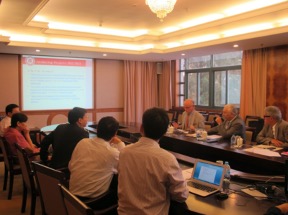
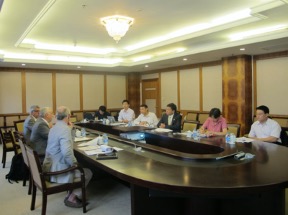
Two projects were selected :
- New organocatalysts for CO2 conversion and studies of the mechanism of CO2 activation
(Dr.Alexandre Martinez & Pr. Gao Guohua) - Characterization of the interferon stimulated gene 20 protein (ISG20), a novel cellular protein with antiviral properties: antiviral and cellular features.
(Dr. Andrea Cimarelli & Pr. Du Bing)
Four continuing projects:
- French-Chinese Lab for Comparing Curricula in Science Education (C2SE)
(Prof. PEI Xinning, Prof. XU Binyan & Prof. Maryline COQUIDE, Prof. Luc Trouche) - Histoire et sociologie de la formation des élites du XIXe siècle à nos jours. Contribution à un cadre de comparaison franco chinois.
(Prof. HUO Yiping & Prof. Jean-Louis Derouet, Prof. Philippe Savoie) - Digital and historical data integration:A three-dimentional reconstruction of Shanghai urban transformation
(Prof.FENG Xiaocai & Prof. Christian HENRIOT) - Synchronization in neural network
(Prof. LIU Zonghua & Prof. Nicolas GARNIER)
The JoRISS Committee convened at East China Normal University (ECNU) in Shanghai on November 9, 2014 with the presence of ECNU chancellor TONG Shijun and ENS Lyon president Jean-François PINTON. The committee examined proposals received following the call for projects 2015 and the proposal for the renewal of the JoRISS agreement.
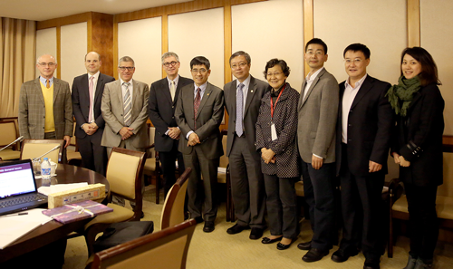
On December 7, the Joriss Steering Committee held a meeting at ENS de Lyon in order to announce the new JoRISS projects 2015/2016 and discuss funding.
On the occasion of the visit of ECNU-JoRISS delegation, led by Prof. WANG Rongming, Vice-president of ECNU, a Joriss Steering Committee was held on March 3, 2016. The committee discussed the 2016 course of activities as well as the future development of JoRISS.
In the meantime, the delegation visited several ENS laboratories. All Lyon based members of on-going JoRISS research operations attended a JoRISS scientific meeting from 4.45 to 6.30 pm on March 3.
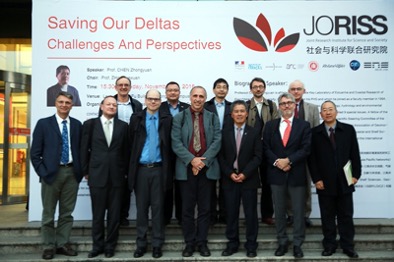
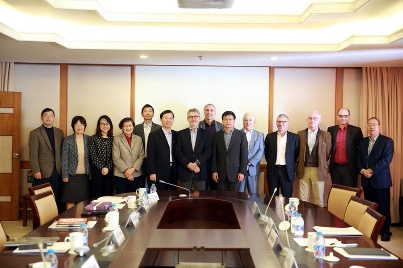
The Steering Committee of Joriss held its 2017 annual meeting at East China Normal University in Shanghai.
The ENS de Lyon delegation, led by its president, went to Shanghai on December 4 & 5, 2018 and participated to the 2018 JoRISS steering committee.
On this occasion the president Jean-François Pinton met Mr. QIAN Xuhong, the new East China Normal University (ECNU) president, historical partner of the ENS de Lyon in China. The two presidents confirmed the commitment of their respective institution to continue to work together on research and educational projects, especially through the JoRISS and PRoSFER programs.
Thereafter, they both chaired the annual steering committee and proceeded to the selection of the JoRiSS projects ensuing from the 2018 call for projects.
3 new projects Have been selected :
- BRICE - Interactions between European Union and China regarding the Belt and Road Initiative: Perspectives and Practices in Central and Eastern Europe. Porteurs : ZANG Shumei & Emmanuelle Boulineau).
- Comparative study of French and Chinese students solving science tasks processes. Porteurs : ZHU Guangtian et Florence Le Hebel
- METAPOLIS. De/constructing cities: exploring urban metabolism through construction materials and deconstruction waste. Porteurs : CHEN Ruishan & Romain Garcier
1 project has been extended :
- Algorithms for Real Time System Fault tolerance on Multi-Processors. Porteurs : LIU Jing & Frédéric Vivien
Le comité directeur JoRISS s’est conclu par la signature du prolongement du programme JoRISS pour les quatre années à venir.
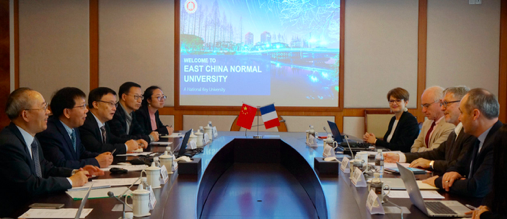
On December 11, 2019 the Joriss Steering Committee held a meeting in order to establish new rules concerning the selection of JORISS projects, discuss on the 2020 budget and select projects from the 2019 call for projects.
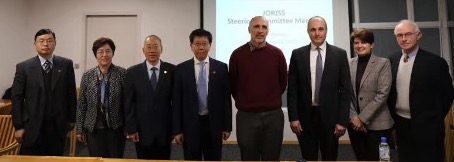
6 projects have been selected:
- Lifespan regulation by the evolutionarily conserved transcription factor Hth/Meis2 (Frédéric MARMIGERE & Xiaotao LI)
- The roles of WDR45 in autophagy in beta-propeller associated neurodegeneration and ageing (Bertrand MOLLEREAU & Lujian LIAO)
- The ERRα nuclear receptor as a modulator of interactions between cancer cells and immune (Jean-Marc VANACKER & Bing DU)
- Schemas and memory in the primate cortex (Sylvia WIRTH & Sze Chai KWOK)
- Health prevention: psycho-physiological effect of traditional breathing exercises on stress Management (Sophie BERTHOUZE, LIN -LI & Marceau CHENAULT)
- The Representation of Old Age in Language, Literature, and among Chinese and French Students (Marie LAUREILLARD & Jiajun WANG)
1 project has been extended:
- Study of the village of Dafen (Eric DAYRE & Penghan WU)






